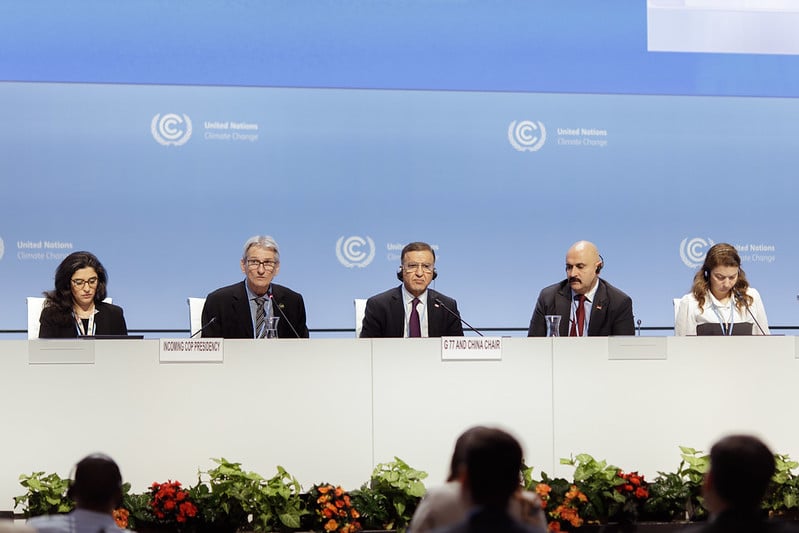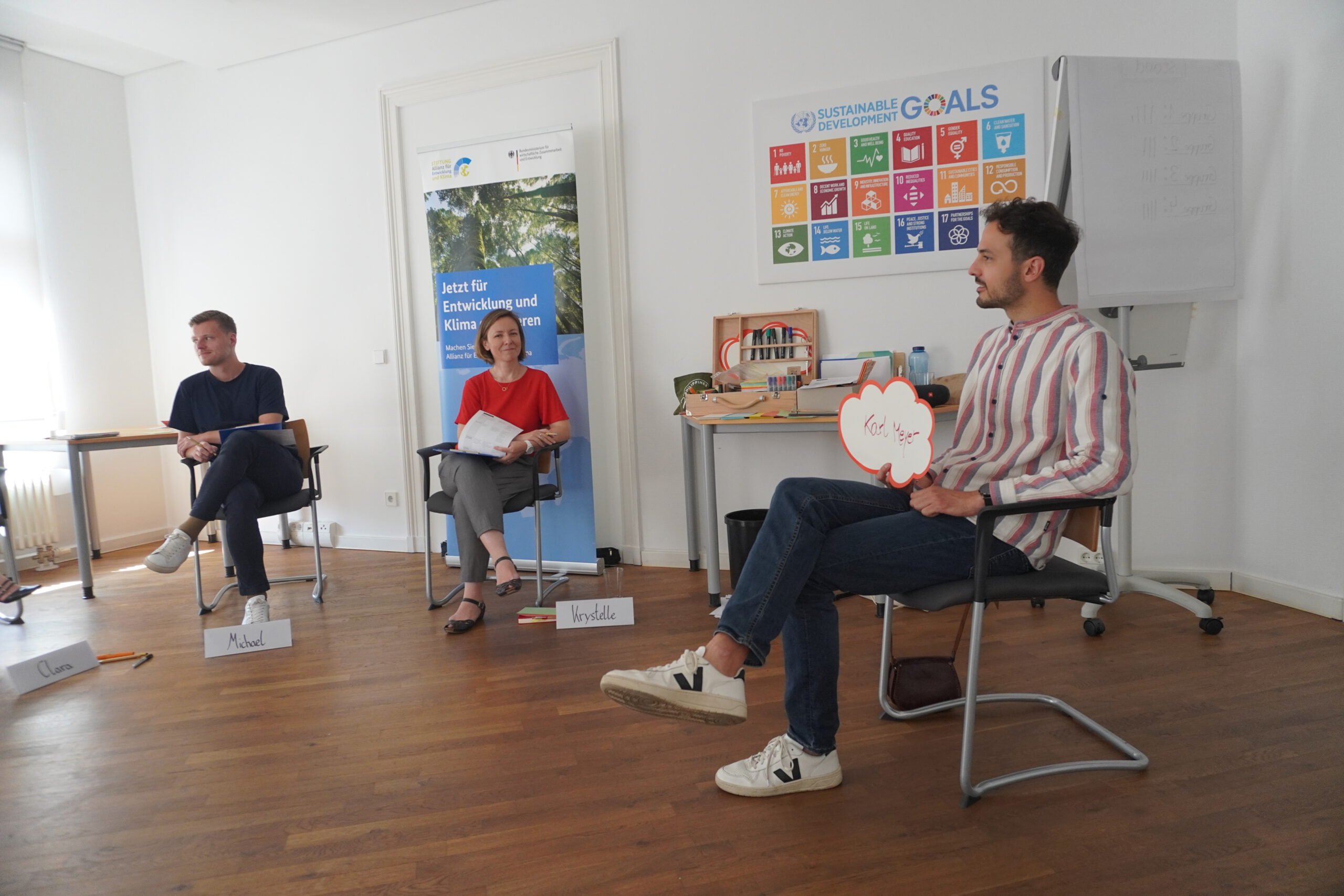
Trust – the Invisible Currency of International Climate Diplomacy

What role does trust play in climate conferences – and how can we strengthen it?Part 2 of the blog article series on "Psychology of COPs"
Part 1: Overview - Psychology of COPs
Part 2: Trust
Part 3: Following
Anyone observing the United Nations climate negotiations (as I did in June 2025 at SB62 in Bonn) sees delegates arguing for hours over text passages. But what ultimately determines success or failure lies deeper: it is trust. Without trust between states, negotiators, and institutions, every agreement remains just paper. With trust, however, doors open – to alliances, compromises, and collective action.
This is where psychology comes in. It helps us understand how trust emerges, why it breaks down, and how it can be strengthened.
Why Trust Is So Difficult – and So Crucial
Trust means being vulnerable: I rely on your word, even though I cannot control whether you will keep it. We know this from our private lives – from romantic relationships and friendships – and how hard it is when trust is betrayed.
On the political level, this vulnerability is particularly pronounced in international climate negotiations. Countries make commitments that cost billions, reshape their economies, or risk attack by domestic opponents.
Current research by Schroeder and colleagues (2024) shows:
-
Social trust – trust in other people – is often medium to high in negotiations. Many delegates trust individual colleagues or allied partners. They have seen each other before, may even like each other, and show goodwill toward individuals.
-
Political trust – trust in institutions, processes, and agreements – remains low. These political structures are created by people who may be trusted individually. Yet their effectiveness and efficiency are often doubted.
This tension is no coincidence: interviews with negotiators repeatedly reveal that transparency, reliability, good-faith action, and shared goals are the key variables for building trust (Schroeder et al., 2024). Political distrust, on the other hand, is fueled by power asymmetries (North–South), lack of representation for small states, opaque processes, and broken financial pledges.
A look at the history of climate processes further shows: institutional design shapes trust dynamics. While the UNFCCC (1992) embedded trust in the process, the Kyoto Protocol (1997) was more marked by institutional distrust. The Paris Agreement (2015), in turn, created new trust by emphasizing shared goals and the logic of common responsibility.
The paradox remains: negotiators sometimes trust one another personally but not the very structures within which they operate.
A Glimpse into the Negotiation Room
At the Bonn interim negotiations (SB62), this paradox was palpable to me as a psychologist. In the evening hours, as fatigue and frustration mounted, the atmosphere often soured. Faces closed off, the mood turned cold. Yet small gestures – a sincere thank you, a smile, an offer of cooperation – could shift the atmosphere and rebuild trust.
At the same time, distrust in the process lingered: Will financial pledges really be honored? Will the Loss & Damage Fund be implemented fairly? This institutional distrust is no accident – it is deeply inscribed in the history of climate negotiations.
Psychological Pitfalls
From psychology, we know that trust is influenced by many invisible dynamics:
-
Fast intuitive judgments: People form impressions of trustworthiness in milliseconds – based on facial expressions or body language. These judgments are not always rational, but they strongly shape the negotiation atmosphere.
-
Bias & loss aversion: States fear giving more than others – and block agreements out of fear of disadvantage.
-
Trust as risk-taking: Every act of trust is a bet on the future. Delegates weigh chances against possible losses – like a risky investment. The more uncertain the outcome, the more important safeguards such as transparency and monitoring become.
-
Sanctions & reputation systems: Trust endures only if breaches can be sanctioned. In climate politics, this means naming & shaming or the risk of exclusion from alliances.
-
Expectations of trustworthiness: Whether I trust someone depends heavily on my expectations – shaped by experience, signals in conversation, or the reputation of a delegation. Consistent behavior and small signs of fairness can shift expectations.
-
Identity & belonging: “Us vs. them” narratives (North vs. South) destroy cooperation. At the same time, trust often functions more strongly within groups than between them. Shared identities (“we are all fighting for the 1.5°C goal”) build bridges.
-
Social identity as a trust signal: People trust others far more when they belong to a shared social group. This “depersonalized trust” is based not on the individual, but on group affiliation and its norms. In international negotiations, shared narratives and visible alliance signals can foster trust even among strangers.
-
Sensitivity to betrayal: Some actors are especially sensitive to past breaches – they overweight the risk of “being betrayed again.” In climate negotiations, this explains why historical disappointments slow trust across entire regions.
-
Multidimensionality of trust: Trust is not just a feeling but consists of three foundations – reliability, emotionality, and honesty. These are visible in concrete behavior – whether promises are kept, information is shared, or processes are fair.
-
Emotion & resilience: Exhaustion amplifies defensiveness. Those who remain emotionally stable can build trust.




What the Research Shows
A large meta-analysis by Hancock and colleagues (2023) confirms three overarching mechanisms in interpersonal trust:
-
Competence, integrity, and transparency are key: Delegates are seen as trustworthy when they act competently, reliably, and transparently.
-
Context matters: Shared narratives, team cohesion, and open communication are as important as individual traits. Conversely, conflict and out-group dynamics erode trust.
-
Individual trust disposition plays a role – but smaller: Traits like self-efficacy, commitment, or general trust readiness help stabilize cooperation, but they matter less than perceived competence and contextual factors.
Ways Forward
Making institutions more trustworthy
Trust requires structures. In climate negotiations, this means clear procedures, verifiable pledges, and transparent decision-making. Breaches must have consequences – through reputational pressure, naming & shaming, or exclusion from coalitions. Only then does trust shift from risky hope to reliable foundation.
Strengthening psychological skills in delegates
Technical knowledge is not enough. Those who can regulate emotions remain able to negotiate even in long sessions. Active listening and perspective-taking open space for compromise. Trust is not an abstract idea but a concrete skill that can be trained.
Deliberately designing negotiation spaces and alliances
Small, stable working groups foster personal relationships. Informal meetings on the sidelines allow for gestures of trust – a thank you, an open conversation, an invitation to collaborate. Alliances with joint appearances or symbols make reliability visible.
Using shared identities to build trust
North–South narratives deepen mistrust. New “we-feelings” – such as the 1.5°C goal as a common project or the Brazilian idea of Mutirão as a symbol of collective effort – can build bridges. Shared identities turn strangers into allies.
Conclusion: Psychology as an Enabler
Trust is not a soft factor but the decisive currency of international climate politics. Without trust, words remain empty. With trust, even deep divides can be bridged.
COP30 in Belém will therefore be a test: will it be possible to revive political trust in institutions – and translate personal trust between delegates into concrete, reliable agreements?
Research makes one thing clear: personal trust alone is not enough. For it to hold, institutional structures must be transparent, inclusive, and reliable – and pledges must finally be fulfilled. Trust is multidimensional and visible in behavior: through reliability, honesty, and fair procedures.
One thing is certain: without psychology, we will neither understand nor strengthen this currency.
Further Reading:
- Clément, F. (2020). Trust: Perspectives in psychology. In The Routledge handbook of trust and philosophy (pp. 205-213). Routledge.
- Evans, A. M., & Krueger, J. I. (2009). The psychology (and economics) of trust. Social and Personality Psychology Compass, 3(6), 1003-1017.
- Hancock, P. A., et al. (2023). How and why humans trust: A meta-analysis and elaborated model. Frontiers in psychology, 14, 1081086.
- Schroeder, H. et al. (2025). The role of trust in the international climate negotiations. Environmental Policy and Governance, 35(2), 328-343.
- Thielmann, I., & Hilbig, B. E. (2015). Trust: An integrative review from a person–situation perspective. Review of General Psychology, 19(3), 249-277.
- Williams, T. (2014). The psychology of interpersonal trust. How people feel when it comes to trusting someone. McKendree University, 22, 1-17.
About the Author
Janna Hoppmann is a psychologist and Mercator Fellow for International Affairs. She has worked for many years at the intersection of psychology, climate, and politics – including with governments of SIDS states, international NGOs, and currently in close exchange with the COP30 Presidency. With ClimateMind, she brings psychological insights into international climate negotiations, into the work of delegations, and into transformative dialogue formats.
👉 If you would like to strengthen your delegation, alliance, or organization at COP30 or beyond – for example through trust-building, resilience training, or strategies for storytelling and collective efficacy – feel free to reach out via email.
Questions or thoughts? Feel free to get in touch – or stay connected with us through our newsletter, online academy, and community.


